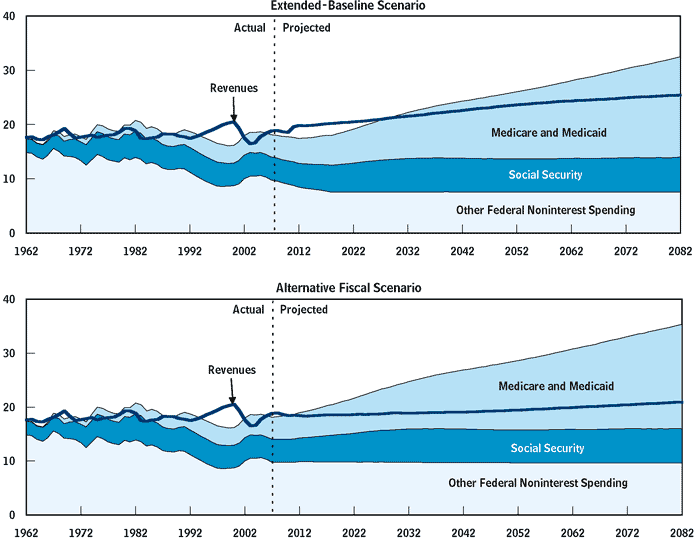President Obama’s Health Care Statement
 Today President Obama announced that in the coming years various segments of the health care industry have pledged to reduce the growth rate of health care expenditures by 1.5%.
Today President Obama announced that in the coming years various segments of the health care industry have pledged to reduce the growth rate of health care expenditures by 1.5%.
And that’s why these groups are voluntarily coming together to make an unprecedented commitment. Over the next 10 years — from 2010 to 2019 — they are pledging to cut the rate of growth of national health care spending by 1.5 percentage points each year — an amount that’s equal to over $2 trillion. Two trillion dollars.
This sounds great, but the first thing that came to mind was, how are we going to measure this? Is the President going to do something unheard of before: namely set some hard measure such as using the growth rate of health care expenditures for the past few years as the benchmark? That is, if health care expenditures have grown at around 6%/year will the benchmark be 4.5% to see if this “plan” will work? Or is it going to be what we usually get, a Bravo Sierra yardstick like what we’ve gotten with the unemployment numbers (create or save x millions of jobs–how do you measure saved jobs?).
My guess is the latter. President Obama wont commit to an actual measure by which we could judge his performance, and it will go something like, “Reduce health care expenditure growth rates by 1.5% what they would be without the Grand Master Plan.” This way the President can simply add 1.5% to whatever the observed rate of growth is for health care expenditures and say that is what it would have been without his brilliant plan, oh and vote for him next election too.
Update: As far as I know, no plans have been released that describe how these savings are to be realized. This leads me to believe that the 1.5% number and the $2 trillion dollar amount are just pulled out of the air because they sound good, and have little basis in reality or an analysis of any kind.
Here is the letter these special interest groups have sent the President.
- Implementing proposals in all sectors of the health care system, focusing on administrative simplification, standardization, and transparency that supports effective markets;
- Reducing over-use and under-use of health care by aligning quality and efficiency incentives among providers across the continuum of care so that physicians, hospitals, and other health care providers are encouraged and enabled to work together towards the highest standards of quality and efficiency;
- Encouraging coordinated care, both in the public and private sectors, and adherence to evidence-based best practices and therapies that reduce hospitalization, manage chronic disease more efficiently and effectively, and implement proven clinical prevention strategies; and,
- Reducing the cost of doing business by addressing cost drivers in each sector and through common sense improvements in care delivery models, health information technology, workforce deployment and development, and regulatory reforms.
Sounds great, but my first thought is…if this is so good, why were they waiting? That last one sounds like what they should be doing already. If an improvement is common sense and reduces costs…why weren’t these special interest groups doing it already? I’m thinking these are just flowery bullet points tossed in their so that it sounds like they have some ideas. I’m thinking their ideas rest on large subsidies, government programs, and other things that will cost lots of money. Of course, they’ll tell us these things will save use n-fold in expenditures in the coming years, but we’ll have no way of verifying it. Why do I think this, well the letter has this curious little passage,
However, there are many important factors driving health care costs that are beyond the control of the delivery system alone. Billions in savings can be achieved through a large-scale national effort of health promotion and disease prevention to reduce the prevalence of chronic disease and poor health status, which leads to unnecessary sickness and higher health costs.
In other words, “We can’t do it…at least not without taxpayer dollars.”
Basically, just another photo-op where the President is taking advance credit for something we have yet to realize the benefits from. Ho-hum.
Update II: Dave Schuler posted this in comments and it is too good to leave there, IMO:
As I pointed out in my post on this subject this morning there’s no plan to reduce healthcare costs, only a hypothetical plan to reduce the rate of increase of healthcare costs. That would be fine if the problem we were facing were that healthcare might become too expensive at some time in the future.
But that isn’t the problem we’re facing. We’re already paying significantly more per capita than any other OECD country. I read the plan as a commitment that healthcare will be decreasingly affordable in the future. That doesn’t sound like a particularly bright prospect to me.
Quite right. Reducing the growth rate of health care expenditures is, I think, part of the solution. But health care is already very expensive and we pay for things via health insurance that we shouldn’t (e.g. child birth). As such I think Dave is right, any reasonable plan should also discuss reducing current costs not just future costs which is what President Obama is talking about. And keep in mind, I think it is quite likely that President Obama will point to these savings as justification for expanding health care coverage which will almost surely increase the amount of health care expenditures.
Photo by Flickr user Brooks Elliot under the Creative Commons license. It has these wonderful sounding non-specific proposals on how this 1.5% will be achieved,





As I pointed out in my post on this subject this morning there’s no plan to reduce healthcare costs, only a hypothetical plan to reduce the rate of increase of healthcare costs. That would be fine if the problem we were facing were that healthcare might become too expensive at some time in the future.
But that isn’t the problem we’re facing. We’re already paying significantly more per capita than any other OECD country. I read the plan as a commitment that healthcare will be decreasingly affordable in the future. That doesn’t sound like a particularly bright prospect to me.
Bravo, great article James.
How Could I have read the whole article without reading the by line, Sorry Steve!
Bravo, Great article Steve!
Did you read Kwak’s piece in The Hearing? I keep going over this, and given the costs of medical care, I think we need insurance, but insurance guarantees higher costs. Quite a conundrum.
Steve
Steve;
I just hunted it down and it is solid elementary and informative, it should be read by anyone wishing to focus or clarify the his perspective.
Oh! and I did get check the by-line before reading the piece!
BTW;
To those interested, here it is(I hope)…
http://voices.washingtonpost.com/hearing/2009/05/health_care_debate_warms_up.html#more
I’m curious why you say health insurance shouldn’t pay for child birth, Steve. I haven’t heard this before (I apologize if I haven’t been paying attention).
How much does it cost to have a baby these days? Luckily, I won’t be having anymore children but 13 years ago I had my son at Camp Lejeune and it cost us $29. I thought that was a pretty good deal.
No, it’s not that healthcare costs cannt be lowered without taxpayer dollars, it’s that it doesn’t move us in the direction of governmental control. You guys appear to me to be operating under the misconception that the golas of these people are the stated… bettering healthcare. That’s not what they’re about. I’ll quote Carol Negro at American Thinker, today:
Playing any of this like it’s a valid idea, plays directly into their hands.
and we pay for things via health insurance that we shouldn’t (e.g. child birth).
Presumably, Steve has in mind that insurance guards against risk, and most (?) children are conceived intentionally. At least, in the circles Steve runs in.
(Query: should insurance cover abortion?)
That leaves to one side the issue of how normal people could afford to have babies. I suppose that the market would adjust to the absence of insurance by deflating the costs somewhat and diminishing the “childbirth spa” syndrome of some “delivery suites.” It would also make sense to offer flexible payment plans.
The more I think about it, health insurance is designed to cover whatever circumstances the designer so desires. Since the coverage of child birth by health insurance is ubiquitous, we can conclude, through de facto evidence, that health care is supposed to cover child birth. Find a plan that doesn’t, for example.
I’m starting to think that saying that health insurance shouldn’t cover childbirth is like saying an “anti-semite” hates Jews and Arabs, since they’re both Semites.
In other words, it doesn’t really matter how something is defined in a sterile environment. How it’s applied in the real world is what matters, and in the real world, health insurance covers childbirth and anti-semites are Jew (not Arab) haters.
Or am I missing your point, Steve (as I so often do)?
Let’s throw out a few random facts:
1) The US spend WAY more on health care than any other OECD country. Almost 20% more per capita than the second place contender (Luxembourg) and twice the OECD average.
2) The US has worse health care than most OECD countries. In addition to lower life expectancy we have a harder time getting service (despite all the claims about dreaded waiting lists). What we do tend to get is the flashiest most expensive service…whether we need it or not.
3) The US, unlike other OECD countries, has its entire healthcare infrastructure designed to be “for profit.”
Gosh, if only there were some blindingly obvious correlation to be drawn from these facts. I mean, if only there were indications that people who sell a product for profit are inclined towards high price and shoddy quality. If only it were well understood that for profit enterprises try to maximize their profit at the expense of the consumer.
Boy then we’d have a real idea how to fix this mess.
CRS report on US healthcare costs. Read it and weep.
The health “insurance” topic is a pet peeve. Its not “insurance” in the classic sense, covering unexpected and large financial losses. Its a comprehensive payment scheme that starts closer to dollar one of expenditure than to the level of large financial loss.
Imagine if your homeowners insurance worked the same way. Suppose instead of covering fire, wind and failed sump pump damage it also covered: 1) painting, 2) new roof, 3) lawn mowing, 4) lawn fertilizer, 5) spring cleaning, 6) pruning the shrubs, 7) etc. And suppose it was paid for by your employer, so its cost was hidden.
Do you think services 1-7 would be in higher demand? Do you think we would be complaining about skyrocketing home insurance premiums and “uncontrolled house care costs?” I do.
Health care “insurance” is structurally unsound.
Isn’t CRS something like Alzheimer’s?
(plebeian dictatorship)
Drew has a great point and I hadn’t really thought of it that way. We’ve always had good/decent medical insurance and even though I haven’t been to a doctor in about 10 years, I do take it for granted.
On the other hand, my husband last year had a malignant melanoma on his neck and after 2 surgeries and Interferon injections all total cost was upwards of $50k. Our out of pocket expense was maybe $2k. Which I still resented having to pay because well, we have insurance, that’s what it’s for right? I’m being unreasonable though, I realize.
Something does need to be done to bring down the costs of these procedures though, I mean if I had a bill for $50k that I had to pay off, that’d be more stress than I can handle. His cancer was considered minor and look at the pricetag to fix it. I can’t imagine the costs involved with major cancers and other medical issues.
I would say that Ms. hcantrall (May 12, 2009 | 10:37 am) should consider herself lucky if her co-pay was only 2K out of a 50K bill to treat a malignant melanoma. The American Cancer Society has identified lack or inadequate health insurance as the major impediment to cancer therapy.
There is little I can add to correspondent Tlaloc (May 12, 2009 | 09:49 am) post, but I should point out that The Organization for Economic Co-Operation and Development (OECD) has a detailed study, titled “HEALTH CARE REFORM IN THE UNITED STATES†which can be found here (click on the British flag). This is an economic study with data which deserves a careful read by those who wish to understand the problems we face. It is a groaner for your printer, not worth a passing glance unless you have an open mind. By definition, that excludes Bithead and Boyd.
Dave Schuller has two post on this matter, one on the 11th, and one today. They are well worth a read to fully grasp the mind of those who offer no solutions to the problems we face.
The quoted (linked) OECD study demonstrates the way health care costs can be decreased, and thus may be of interest to Steve Verdon and Dave Schuler.
hcantrall –
First, malignant melanoma is in no way, shape, or form “minor.” Other than pancreatic cancer, it may be one of the the worst diagnoses one could receive. And so you should vigorously pursue competant medical advice and treatment on behalf of your husband; no caveats, no excuses or qualifiers. Period. Do it as if it was the most important thing you ever did in your life.
Second: your husband is the “poster boy” case for proper medical insurance. The rare, catastrophic diseaase that could bankrupt a household. This is what medical insurance should be about. Not a maintenance contract for the sniffles.
Thanks Drew, I didn’t mean to come off like malignant melanoma is a no big deal thing. It was a huge thing but we caught it relatively early so it didn’t spread past the lymph nodes and thankfully he had excellent care at Emory University. Our insurance took care of most of the costs. So yes, this is the kind of thing insurance should be about, I agree.
However, the costs involved, even after getting rid of the cancer are outrageous. He has to see his oncologist quarterly, tests etc and these tests are so horribly expensive. Not so much to us but I see what the hospital bills the insurance and I can’t believe how much it’s costing. He had to have a brain MRI a few months back and it was over $8k of which I’m paying $1k. How long has MRI tech been around now? Why is it still so expensive?
Thanks for the ad hominem, Paul. When people are compelled to sink to such levels, it reveals the bankruptcy of their ideas.
No ad hominem intended Boyd, just a crude attempt to get folks to read the posted link. Perhaps it is my academic background (run for your lives, the elitists are on the warpath), perhaps it is the thirty years I spent in the trenches as a doc, but the one thing I got to tell you, nothing frosts my buns more than having ideological clap trap thrown at a problem.
The key questions is whether folks recognize the problem we face, and what potential solutions are available. If you have an open mind, read the posted link. It presents economic arguments, medical outcome results, and potential solutions. It is not a warm fuzzy liberal flight of fancy, it presents data, not ideology.
If you feel aggrieved and disrespected, I apologize, that was not my intent. I have no way of sending you flowers or bon-bons to go with my apology, perhaps this rather droll description of an American in Holland may ease your discomfort.